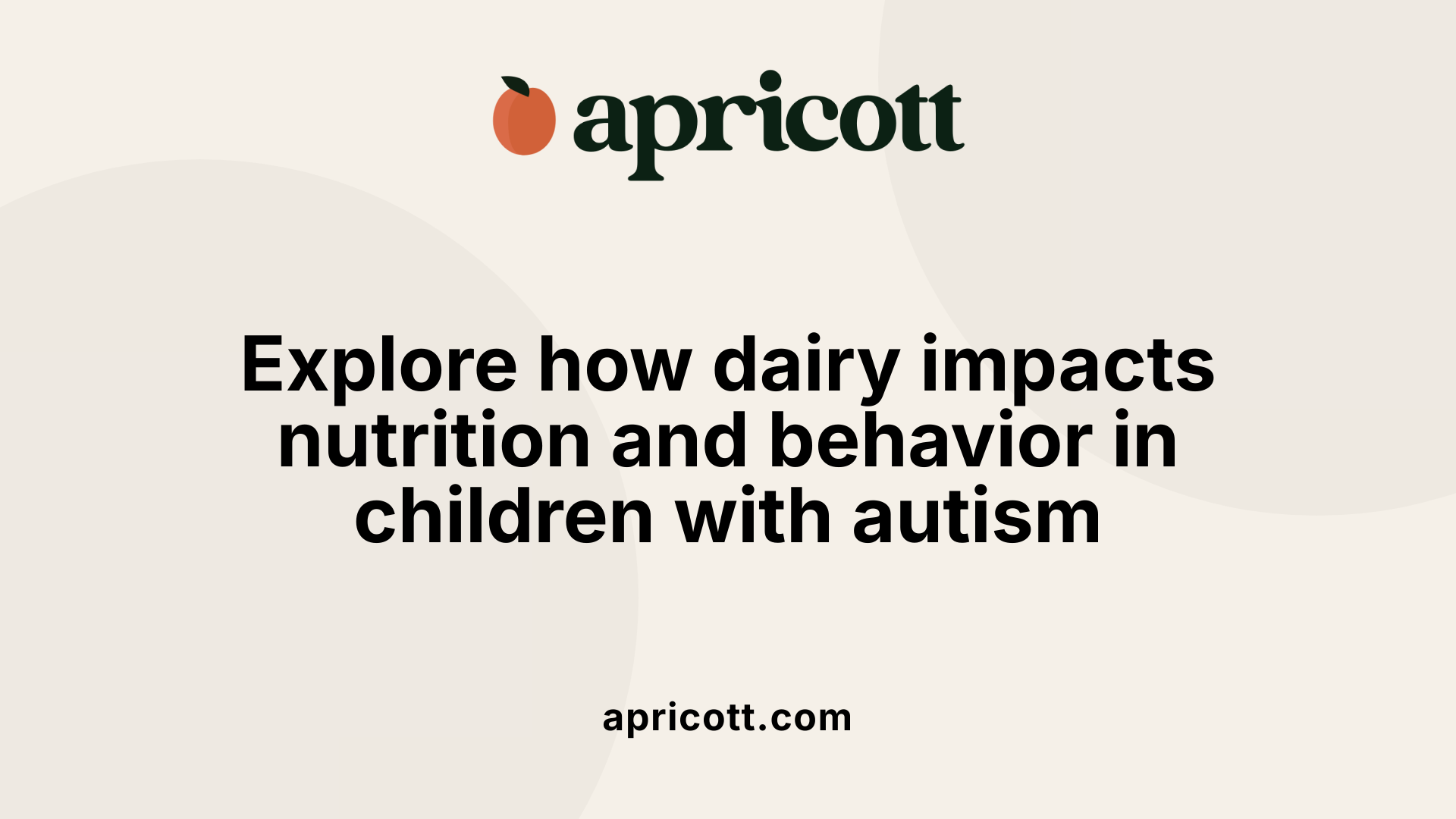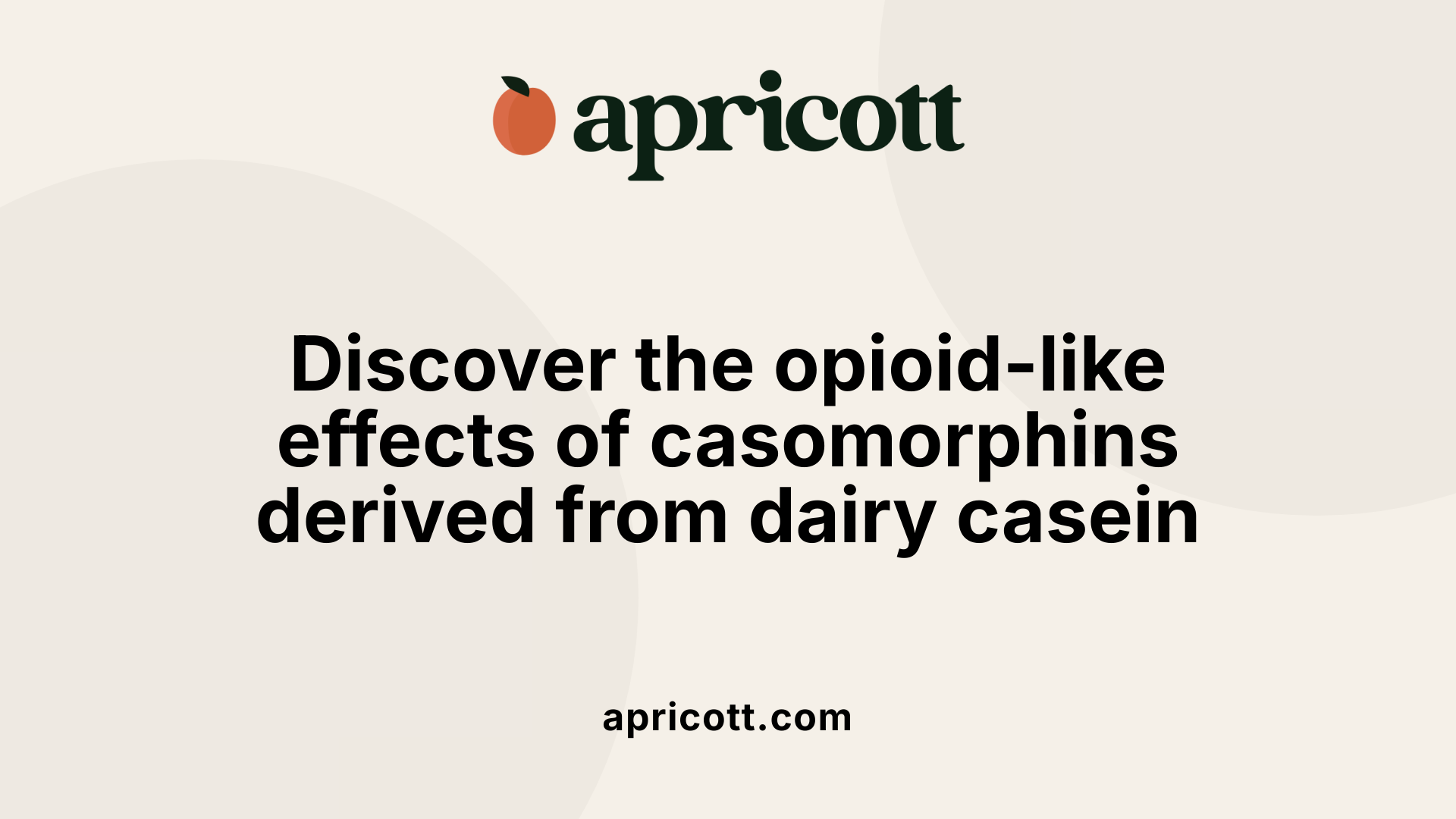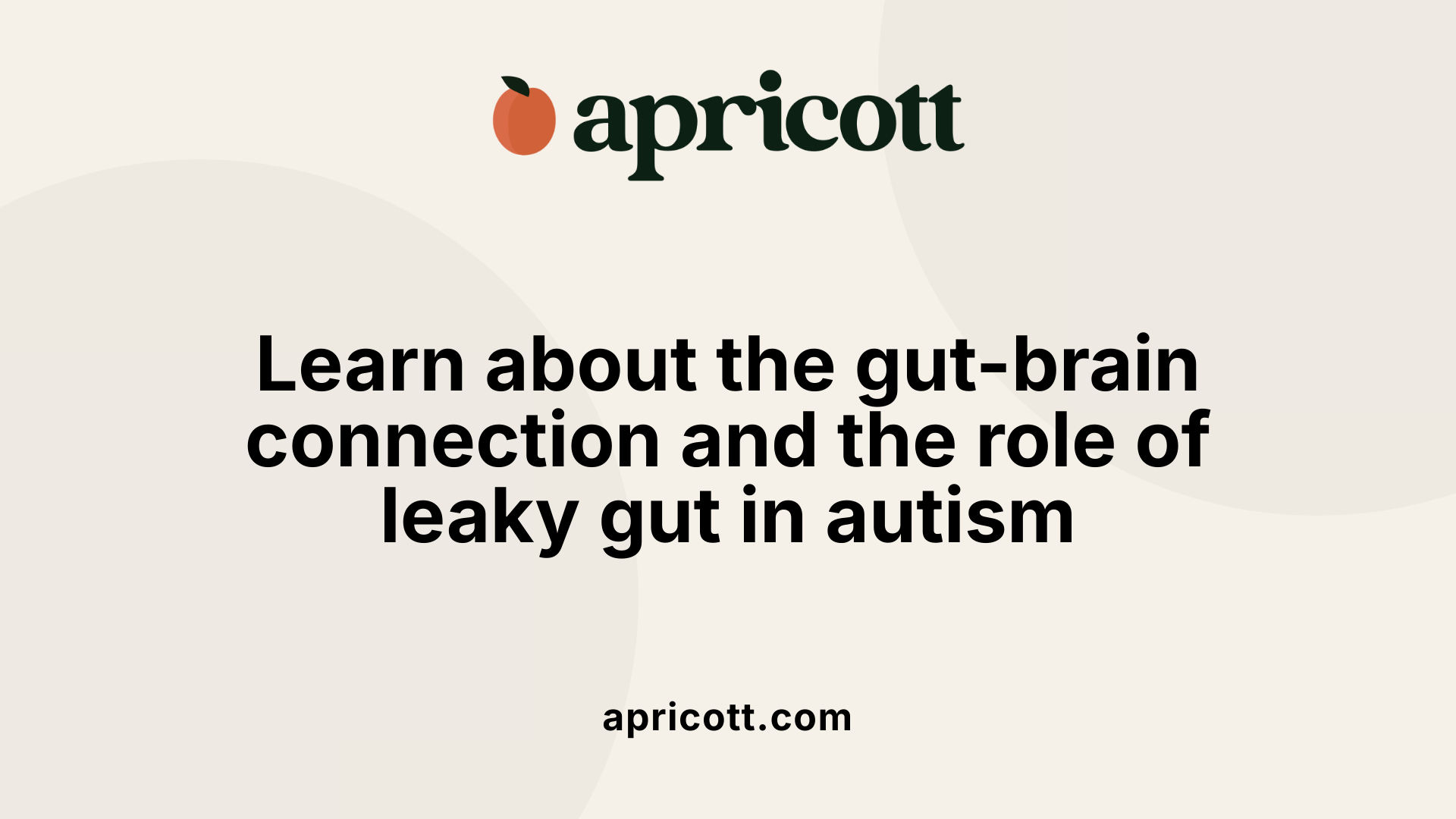September 22, 2025
Exploring the Complex Relationship Between Dairy and Autism Spectrum Disorder
Dietary choices significantly influence the health and behavioral patterns of children with autism spectrum disorder (ASD). Among these, dairy consumption has garnered notable attention due to its potential impact on symptoms and overall well-being. This article explores the current understanding of how dairy intake interacts with autism, examining components like casein, dietary interventions, ongoing research, and health recommendations for individuals with ASD.

Research shows that children with ASD tend to consume less dairy than their typically developing peers. This reduced intake can lead to deficiencies in vital nutrients like calcium, vitamin D, B12, and other micronutrients important for growth and brain health.
Lower dairy consumption in children with autism is also linked to gastrointestinal issues, common in this group, which can hinder the absorption of key nutrients. Some studies investigate whether dairy components, particularly casein, influence autistic behaviors, but no conclusive causal link has been established.
Differences in dietary habits across regions and individual health conditions also impact nutritional status and autism severity. Overall, dairy intake is an important factor in the nutritional well-being of children with ASD, though its exact role in the development and symptoms of autism needs further exploration.

Casomorphins are small protein fragments that originate from the digestion of casein, the main protein found in dairy products like milk, cheese, yogurt, and butter. When casein is broken down during digestion, it releases these peptides, which resemble opioid compounds in structure. Because of this resemblance, casomorphins are capable of interacting with the brain's opioid receptors.
Once formed, casomorphins can bind to opioid receptors in the brain, producing effects similar to those caused by opioid drugs, such as pain relief or sedation. This interaction can influence mood, alertness, and behavior. In some individuals, especially those with compromised gut integrity, casomorphins may pass into the bloodstream and reach the brain, potentially affecting neural function.
For children with autism spectrum disorder (ASD), the influence of casomorphins might be particularly significant. Some autistic individuals have increased intestinal permeability, often called 'Leaky Gut Syndrome,' which allows these peptides to bypass normal digestive barriers. Upon reaching the brain, casomorphins could contribute to symptoms such as brain fog, mood swings, and difficulties with social engagement. Furthermore, these opioid-like effects might exacerbate behavioral challenges, hyperactivity, or communication issues common in ASD.
While research continues, many parents and clinicians observe that reducing or eliminating dairy intake can lead to improvements in some behaviors and gastrointestinal symptoms. This supports the idea that casomorphins’ opioid activity from dairy might influence certain autistic behaviors, although responses vary among individuals.
Components of dairy, such as casein, have been studied for their potential impact on behaviors and symptoms in individuals with autism, but the evidence remains mixed and inconclusive. Some research suggests that a gluten-free/casein-free (GFCF) diet may lead to improvements in cognitive skills, behavioral patterns, and gastrointestinal symptoms in certain children with ASD, possibly due to factors related to digestion, immune responses, or the gut-brain connection. However, other studies, including well-controlled trials, have found no significant effects of eliminating gluten and casein on autism behaviors or related symptoms. The variability in study results highlights the need for more high-quality, large-scale research to determine who might benefit from such dietary interventions. It is important for families to consult healthcare professionals before implementing restrictive diets, as there are potential nutritional risks and challenges associated with dairy elimination.

Research shows that many children with ASD tend to consume less dairy than their neurotypical peers. This pattern may lead to deficiencies in crucial nutrients like calcium and vitamin D, which are vital for bone health and overall growth. Additionally, lower dairy intake correlates with reduced serum levels of B12 and D, potentially impacting neurological development.
Importantly, children with ASD often experience gastrointestinal issues, which can be worsened by dietary deficiencies. While the exact connection between dairy and autism remains complex, some studies are investigating whether components of dairy, particularly casein, influence autistic behaviors. Casein can produce casomorphins, small protein fragments with opioid effects, which may affect brain function.
Regional dietary habits and nutritional status further influence symptoms and health outcomes in ASD. Although current evidence suggests that limiting dairy might benefit some children, researchers emphasize the need for more definitive studies to clarify causality and optimal dietary strategies.
Yes, multiple modern studies are exploring how dairy influences autism symptoms. Researchers are examining immune responses to dairy proteins, changes in the gut microbiome, and behavioral patterns following dietary adjustments.
Some investigations focus on gluten-free/casein-free (GFCF) diets, which exclude dairy and gluten, to assess their impact on behavior and gastrointestinal health. While some parents and clinicians report improvements, scientific consensus has yet to definitively prove these diets' effectiveness.
Moreover, correlations between dairy consumption and emotional or behavioral issues are under scrutiny. Findings indicate that children with ASD who consume less milk may show increased prosocial behaviors, while higher soda consumption, often containing added sugars, correlates with emotional problems. These observations fuel further research efforts to understand diet-related influences on autism.
In many children with ASD, the integrity of the small intestine may be compromised — a condition known as ‘Leaky Gut Syndrome’. This condition involves increased intestinal permeability, allowing food particles and other substances like casomorphins to pass through the gut lining and enter the bloodstream.
Casomorphins, derived from the digestion of casein, can bind to opioid receptors in the brain, potentially leading to brain fog, mood swings, and aggravating autistic behaviors. This abnormal passage of food particles and neuroactive compounds may contribute to inflammation and neural overstimulation, exacerbating ASD symptoms.
Maintaining a healthy gut barrier appears crucial for reducing inflammation and neurological impacts associated with ASD. Diets free of dairy and gluten are often recommended to minimize sources of inflammation and overstimulation.
Implementing dietary changes, such as removing dairy, sugar, artificial preservatives, and gluten, may improve gastrointestinal health. As a result, some children experience fewer behavioral challenges, hyperactivity, and gastrointestinal discomfort.
| Aspect | Impact | Additional Notes |
|---|---|---|
| Dairy exclusion | Potential reduction in brain fog, hyperactivity | Includes milk, cheese, yogurt, and hidden sources |
| Casomorphins | May affect mood and cognition | Derived from casein digestion, opioid-like effect |
| Gut health | Essential for behavioral and physical health | Leaky gut may lead to neuroactive substance entry into bloodstream |
| Dietary components | Influence inflammation and overstimulation | Sugar, gluten, artificial additives, and corn linked to worsening symptoms |
Understanding the connection between diet, gut health, and autism is ongoing. Exploring how maintaining a healthy gut barrier and limiting certain foods can potentially alleviate some ASD symptoms remains a promising area for research.

For many children with autism, removing dairy from their diet can lead to noticeable improvements in behavior and gastrointestinal health. Dairy products like milk, cheese, yogurt, butter, and sour cream contain proteins such as casein and lactose, which some individuals with autism are sensitive or intolerant to.
Casein, a milk protein, can produce exorphins—small protein fragments with opioid effects—that may contribute to brain fog, mood swings, and autistic behaviors. Additionally, these proteins can cause gastrointestinal discomfort, inflammation, and sleep problems.
Research suggests that a trial period of 4 to 6 weeks of dairy elimination can help assess the impact on behavior and GI health. Some children show significant behavioral improvements, including reduced hyperactivity and better communication after removing dairy for this duration. Longer trials extending beyond six months may yield more pronounced benefits.
Gastrointestinal issues are common in autism—up to 8 times more than in typically developing children—and are often linked to food sensitivities. Removing dairy might help alleviate symptoms such as bloating, abdominal pain, and irregular bowel movements.
However, taking out dairy can lead to nutritional gaps, especially in calcium and vitamin D. It is vital to replace dairy with fortified milk alternatives like almond, soy, rice, or oat milk, ensuring adequate intake of these nutrients. Since gut health is essential for overall well-being and autism symptom management, dietary changes should be carried out under the supervision of healthcare providers, such as dietitians.
Overall, tailored dietary adjustments, including dairy elimination, can positively influence behavior, gastrointestinal health, and sleep patterns in some individuals with autism. Close monitoring is necessary to balance behavioral benefits with maintaining proper nutrition.

Many nutrients play vital roles in supporting children with autism by promoting brain health, reducing inflammation, and enhancing immune function.
Omega-3 fatty acids, found in fish oils and some fortified foods, are essential for brain development and have anti-inflammatory properties. Vitamins B12 and B6 are crucial for nerve function and energy production, potentially aiding in improving behavioral and cognitive symptoms. Vitamin C supports immune health and acts as an antioxidant, helping to combat oxidative stress common in autism. Magnesium influences nerve transmission and muscle relaxation, which can help reduce hyperactivity. Vitamin D is important for immune regulation and brain development, with some studies suggesting that deficiency may be linked to worsening autism symptoms. Zinc contributes to immune function and neuroplasticity, which are vital for cognitive and behavioral health.
These nutrients collectively support the nervous system by promoting healthy nerve signaling, reducing oxidative stress, and modulating inflammatory responses. Omega-3 fatty acids, for example, decrease systemic inflammation and support the integrity of neuronal membranes, aiding in communication between brain cells. Vitamins B12 and B6 help in synthesizing neurotransmitters, which are crucial for mood regulation and cognitive functioning. Vitamin C and zinc act as antioxidants, reducing free radicals that can damage cells and contribute to inflammation. Adequate vitamin D levels are associated with lowered inflammation and improved cognitive functions, which may positively influence autism symptoms.
Diet profoundly affects inflammation levels in the body, which can impact brain function and behavior in children with autism. Reducing intake of sugar, refined carbs, artificial ingredients, and preservatives helps lower systemic inflammation, potentially alleviating some autism symptoms. Avoiding gluten, dairy, and corn — which may trigger immune responses and gut issues — can improve gastrointestinal health and reduce behavioral problems. Removing pro-inflammatory foods and incorporating anti-inflammatory nutrients can enhance immune function and decrease symptoms of brain fog and hyperactivity. Nutritional strategies that optimize omega-3 fatty acids, vitamins, and minerals support overall health, reduce gastrointestinal discomfort, and possibly lead to better social and communicative behaviors.
| Nutrient | Food Sources | Role in Autism Management |
|---|---|---|
| Omega-3 Fatty Acids | Fish oils, fortified foods, flaxseeds | Reduce inflammation, promote brain health |
| Vitamin B12 & B6 | Meat, eggs, fortified cereals | Support nerve function, energy production |
| Vitamin C | Citrus fruits, berries, peppers | Antioxidant, immune support |
| Magnesium | Nuts, seeds, leafy greens | Nerve transmission, hyperactivity reduction |
| Vitamin D | Sun exposure, fortified foods | Immune regulation, brain development |
| Zinc | Meat, seeds, legumes | Neuroplasticity, immune health |
Many children with autism benefit from targeted nutritional support alongside dietary modifications. Supplementation of omega-3s, vitamins, and minerals can bolster the nervous system, lessen inflammatory responses, and improve gastrointestinal health. It is important that these nutritional strategies are implemented under professional guidance, ensuring the child’s specific needs are met without risking deficiencies or adverse reactions.
Diet plays a significant role in modulating inflammation in the body, particularly in children with autism. Foods high in sugar, refined carbohydrates, and artificial additives have been linked to increased systemic inflammation and erratic brain activity. For example, sugar-sweetened beverages (SSBs) are associated with emotional problems, while processed foods often contain preservatives and artificial flavors that may worsen behavioral issues.
Gluten, a protein found in wheat, barley, and rye, can promote inflammation and affect brain function. Some children experience behavioral improvements after eliminating gluten from their diet. Corn, often contaminated with pesticides and rich in omega-6 fatty acids, can also promote inflammation, potentially worsening ASD symptoms.
Additionally, foods rich in refined carbs and empty calories can impact blood sugar levels, leading to mood swings and hyperactivity. Avoiding these or reducing their intake may help stabilize behavior and improve overall well-being.
Inflammation is a common thread linking diet and autism. In the gut, inflammatory foods can damage the intestinal lining, leading to 'Leaky Gut Syndrome,' which allows food particles and toxins to enter the bloodstream. This can trigger systemic inflammation and impact brain health.
In the brain, inflammation may interfere with neurotransmitter function and neuronal communication, exacerbating symptoms such as hyperactivity, focus difficulties, and mood disturbances. Certain proteins, like casomorphins derived from casein in dairy, can act as exorphins, binding to brain receptors and possibly contributing to behavioral problems.
Children with ASD are eight times more likely to experience gastrointestinal issues, which often correlate with behavioral symptoms. Managing this inflammation through diet can reduce gastrointestinal discomfort and support better mental health.
To combat inflammation, dietary modifications should focus on eliminating or reducing foods known to promote inflammatory responses. This includes avoiding sugar, artificial preservatives, and gluten, as well as limiting intake of corn.
Incorporating anti-inflammatory nutrients such as omega-3 fatty acids, vitamin B6, B12, D, vitamin C, magnesium, and zinc can support nervous system health and reduce inflammation. These nutrients are essential for maintaining balanced brain and gut functions.
A diet rich in fruits, vegetables, and omega-3 sources like fish or algae can help counteract inflammation. Using specialized dietary protocols, such as removing casein and gluten, may lead to improvements in gastrointestinal and behavioral symptoms.
Ensuring adequate intake of calcium and vitamin D from fortified milk alternatives provides nutritional support without the risks associated with dairy proteins.
Overall, personalized dietary strategies focusing on reducing inflammatory foods while boosting supportive nutrients can influence health outcomes positively in children with autism.
Certain vitamins and minerals play vital roles in helping to manage autism symptoms by reducing inflammation, enhancing brain function, and bolstering immune health. Notably, omega-3 fatty acids, vitamin B12, B6, C, magnesium, vitamin D, and zinc are often highlighted for their potential benefits.
Omega-3 fatty acids, found in fish oil and some plant sources, are well-known for their anti-inflammatory properties and their role in supporting brain development and function. They can help improve focus and reduce hyperactivity in some children.
Vitamins such as B12 and B6 are crucial for neurological health, aiding in nerve transmission and energy metabolism. Vitamin C acts as an antioxidant, helping to reduce oxidative stress and support immune function.
Minerals like magnesium and zinc are also essential for nerve signaling and immune regulation. Vitamin D, which has roles in immune modulation and neurodevelopment, is often deficient in children with autism and may influence behavioral symptoms.
In autism, inflammation in the brain and gut is common and may be linked to behavioral and sensory symptoms. Omega-3 fatty acids and antioxidants like vitamin C and zinc help shrink inflammation and protect cells from oxidative damage.
Moreover, nutrients like vitamin D and magnesium support normal brain signaling, mood regulation, and sleep patterns. Their adequate levels can potentially reduce hyperactivity and improve communication skills.
While adjusting the diet is crucial, supplements can provide additional support, especially in cases of deficiencies. It is recommended that supplementing with these nutrients be done under medical supervision to prevent overdose and interactions.
Integrating supplements with dietary modifications, such as eliminating inflammatory foods like dairy, gluten, and refined sugars, can create a comprehensive approach to managing ASD symptoms.
| Nutrient | Role in Autism Support | Typical Sources | Notes |
|---|---|---|---|
| Omega-3 fatty acids | Reduce inflammation, support brain function | Fish oils, flaxseeds, walnuts | Consult healthcare provider for dosage |
| Vitamin B12 | Nervous system health, energy production | Animal products, fortified foods | Often deficient in children with autism |
| Vitamin D | Immune regulation, neurodevelopment | Sunlight, fortified foods, supplements | Check levels before supplementing |
| Zinc | Immune health, nerve signaling | Meat, shellfish, legumes | Ensure balanced intake to avoid toxicity |
| Magnesium | Sleep, nerve function | Nuts, seeds, leafy greens | May help with hyperactivity |
| Vitamin C | Antioxidant, immune support | Fruits, vegetables | Supports reducing oxidative stress |
This integrated approach of nutrition and supplementation aims to support a child's overall health, help mitigate inflammation, and improve behavioral and cognitive functions related to autism.
For many children and adults with autism, dairy products can pose specific health concerns. These include sensitivities or intolerances to components like casein, the main protein in milk. Such sensitivities often manifest as gastrointestinal issues like bloating, discomfort, and altered bowel habits, along with behavioral concerns such as hyperactivity or sleep disturbances.
Research indicates that removing or reducing dairy intake—particularly casein—over a trial period of 4 to 6 weeks can sometimes lead to noticeable improvements in behavior, gastrointestinal health, and overall mood. Some studies report longer-term benefits when dairy elimination extends beyond six months.
An important aspect of managing dairy restrictions is ensuring nutritional adequacy. Since dairy is a primary source of calcium and vitamin D, it's recommended to substitute with fortified milk alternatives such as almond, soy, rice, oat, or pea milks. These are typically fortified with essential nutrients, helping to prevent deficiencies.
Additionally, children with autism are more prone to gastrointestinal issues, often related to food sensitivities and intolerances. Therefore, dietary adjustments involving dairy should always be done under the supervision of healthcare professionals, such as dietitians, to balance benefits and nutritional health.
Recognizing individual differences is crucial; what benefits one person may not help another. As such, personalized dietary plans grounded in medical guidance are essential to effectively support both health and autism symptoms.
Current evidence suggests a strong link between diet and autism severity, influencing behaviors and health conditions. Ongoing research aims to improve understanding of how specific foods, such as dairy, gluten, and processed sugars, interact with neuroinflammation, gut health, and brain function.
Discoveries related to the microbiome and its influence on autism symptoms are guiding more tailored dietary interventions. Future studies may identify biomarkers to predict individual responses to diets, making personalized nutrition a more viable and effective approach.
The development of safe, accessible, and scientifically supported dietary guidelines is crucial. As research progresses, we expect to see more refined protocols that integrate dietary modifications with nutritional supplementation, behavioral therapy, and medical treatment.
Furthermore, expanding our understanding of nutrient roles—like omega-3 fatty acids, vitamins B6, B12, D, zinc, and magnesium—could enhance overall strategies for neurodevelopment support.
Advances in autism research increasingly acknowledge the importance of diet as part of a comprehensive management plan. Personalized nutrition, guided by medical professionals, can help mitigate symptoms, improve gastrointestinal health, and enhance quality of life.
Continued research endeavors are essential to clarify the complex interactions between diet, gut health, immune function, and neurobehavioral outcomes in autism. This will foster interventions that are safe, effective, and tailored to individual needs, ultimately supporting better health outcomes for those on the autism spectrum.
While current evidence provides intriguing insights into the potential links between dairy and autism, it underscores the complexity of nutritional influences on ASD symptoms. Elimination of dairy has shown benefits for some, particularly in reducing gastrointestinal issues and hyperactivity, but it is not a universal remedy. The importance of personalized dietary planning, guided by healthcare professionals, cannot be overstated. As ongoing research continues to shed light on the gut-brain axis, immune responses, and nutritional factors, a nuanced approach that combines dietary modifications with appropriate nutrient supplementation offers the most promising pathway. Future studies will hopefully clarify causality and optimize strategies to support the health and development of individuals with autism.